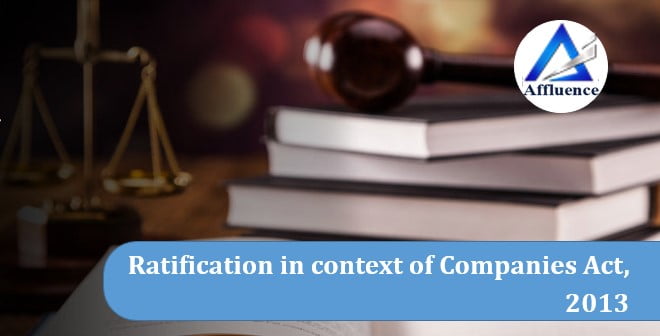The expression “ratification” was precisely defined by the English Court in one old case, Hartman v. Hornsby as under “Ratification” is the approval by act, word, or conduct, of that which was attempted (of accomplishment), but which was improperly or without proper authority performed in the first instance.”
The concept of Ratification is derived from Legal Maxim “Omnis ratihabitio retrorahitur et mandato priori aequiparatur”, which means that every ratification is dragged back and treated as equal to a command or previous authority. In simple terms, it means that the Doctrine of ratification comes into the picture if a person has done something on behalf of another person without any authority, knowledge, or consent, then if such “other person” ratifies the same, then the same result would come as if the act was done on his own.
In the Context of Companies Act, 2013, Ratification is a procedure through which an irregularity in the running of the company is sanctioned by the shareholders and a director is absolved from his/her personal liability to the company arising from a breach of duty. However, shareholders can ratify only certain kinds of breaches; this means adopting, where a director lacked authority to transact on behalf of the company, or affirming, where a transaction entered into by a director was voidable. Certain breaches such as fraud committed by administrators, however, are non-ratifiable breaches. Ratification in order to be effective can only be by an authority that is in existence on the day the transaction was entered into and it should also be competent to ratify.
The provisions of ratification can be traced in the following sections of the Companies Act, 2013:
- Section 173 – Meetings of the Board of Directors: A meeting of the Board shall be called by giving not less than seven days‘ notice in writing to every director at his address registered with the company and such notice shall be sent by hand delivery or by post or by electronic means. Provided that a meeting of the Board may be called at shorter notice to transact urgent business subject to the condition that at least one independent director if any, shall be present at the meeting. Provided further that in case of absence of independent directors from such a meeting of the Board, decisions taken at such a meeting shall be circulated to all the directors and shall be final only on ratification thereof by at least one independent director, if any.
- Section 188- Related Party Transactions: Where any contract or arrangement is entered into by a director or any other employee, without obtaining the consent of the Board or approval by a resolution in the general meeting under sub-section (1) and if it is not ratified by the Board or, as the case may be, by the shareholders at a meeting within three months from the date on which such contract or arrangement was entered into, such contract or arrangement shall be voidable at the option of the Board and if the contract or arrangement is with a related party to any director, or is authorized by any other director, the directors concerned shall indemnify the Company against any loss incurred by it.
The Court has interpreted the word “ratification” through its various judgments in the cases such as:
- Parmeshwari Prasad Gupta vs The Union Of India in which the Supreme Court has held that though the telegram and the letter of the chairman terminating the services of the appellant were in pursuance of an invalid resolution, the subsequent resolution passed by the board confirming the action of the chairman amounted to ratification by the board of the action of the chairman. The Supreme Court observed that “Ratification is related back to the date of the act ratified.”
- It can also be observed from Maharashtra State Mining Corporation vs Sunil S/o Pundikaro Pathak, that the Managing Director’s order dismissing the respondent from the service was admittedly ratified by the Board of Directors in a validly held Board Meeting, and the Board of Directors unquestionably had the power to terminate the services of the respondent. On the basis of the authorities noted, it must follow that since the order of the Managing Director had been ratified by the Board of Directors such ratification related back to the date of the order and validated it.
- The most recent case of Terrascope Ventures Limited vs. SEBI was the one in which the SAT observed that the expression “Ratifies/ratification means making valid of an act already done. It further stated that the ratification is done by Special Resolution on September 29, 2017, approved the acts and deeds of the Company which were improperly done or performed in the first instance and, therefore it was incorrect on the part of the AO to hold that passed illegal acts or deeds cannot be legitimized by subsequent ratification by passing a resolution by the shareholders of the Company.” SAT observed that once the utilization of the proceeds has been ratified by the shareholders of TVL, the acts and deeds done become valid and authorized and therefore there was no variation in the utilization of the proceeds. SAT observed that the show cause notice alleging variation in the utilization of the proceeds was, thus, erroneous.
- In the case of Rajendra Nath Dutta and Ors. vs Shibendra Nath Mukherjee And Ors, the learned counsel argued that the execution of the document by the managing directors, without the common seal, is an ultra vires act and a subsequent resolution cannot ratify it. Based on this argument the court further held that “while an act which is ultra vires the company is incapable of ratification, an act which is intra vires the company but outside the authority of the directors may be ratified by the company in proper form.”
Conclusion:
Hence from the above-mentioned provisions and case laws, it can be concluded that acts, deeds, and decisions which are subject to ratification are voidable in nature. Ratification clearly says that where acts are done by one person on the behalf of another, but without his knowledge or authority, he may elect to ratify or disown such acts. If he ratifies them, the same effects will follow as if they had been performed by his authority. Moreover, in an act which is Ultra Vires the directors of the company can be ratified by the Shareholders. If it is Ultra Vires the Articles of Association of a Company then it can be ratified by a special resolution. However, an act Ultra Vires the Company i.e. which is not authorized in the Memorandum of Association or the Statute of a company cannot be ratified even by unanimous consent of shareholders. Ratification can only be done on the acts which can be made valid or binding by the authority.
Disclaimer: This article has been carefully prepared, but it has been written in general terms and should be seen as broad guidance only. This article cannot be relied upon to cover the specific situation and you should not act, or refrain from acting, upon the information contained therein without obtaining specific professional advice. Please contact Affluence Advisory Private Limited to discuss these matters in the context of your particular circumstances. Affluence Advisory Private Limited, Its Partners, Directors, Employees, and agents do not accept or assume any liability or duty of care for any loss arising from any action taken or not taken by anyone in reliance on the information in this article or for any decision based on it.










